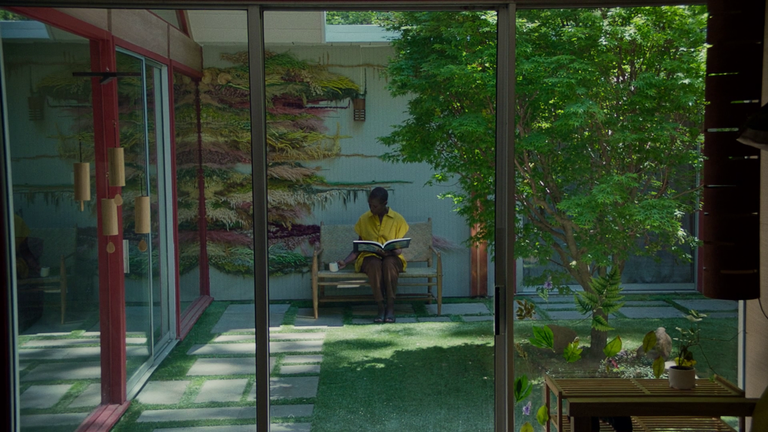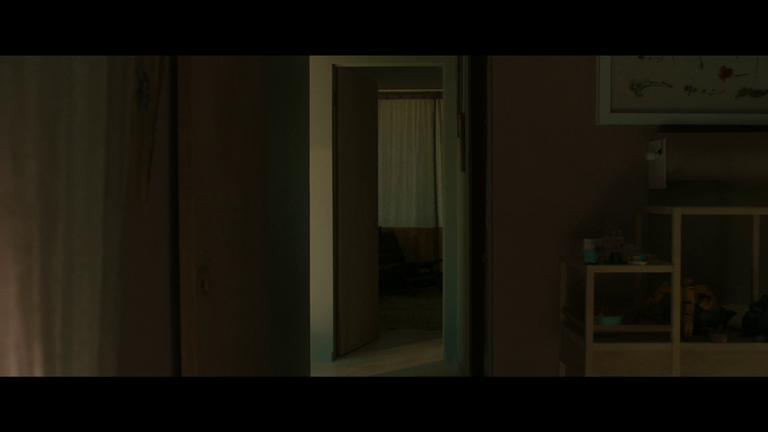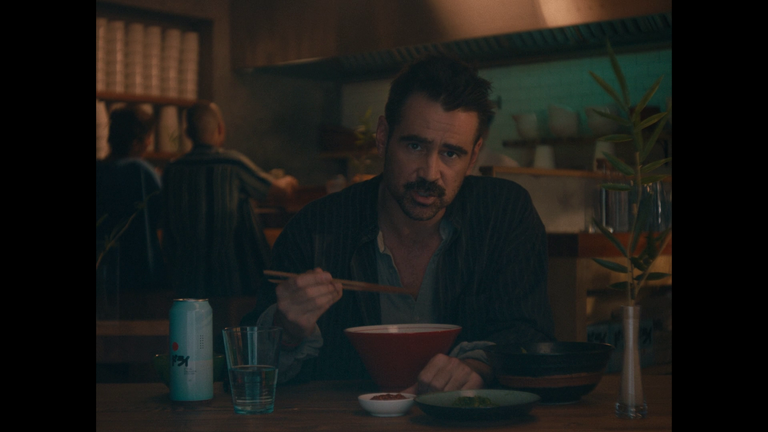'After Yang' by Kogonada Review: A beautiful reflection on life's fragility and memory

After Yang is a film that has been sitting on my watch list for months now. I found the film having looked through actor Colin Farrell's recent works after watching through In Bruges for an unknown time. For some reason it got put aside and I completely forgot about it despite seeing some general praise for the film over the months. It is surprising that it did not get as much recognition as I believed it would given it holds the A24 title, though I suspect many present issues resulted in it getting a somewhat lackluster release where cinemas were mostly ignored and streaming services displayed little interest in obtaining some licensing rights for a while. Though having seen the film, I now believe it is a great shame that this may have been the case. This is one of the most simple and beautiful stories I have seen in a long, long time.
This is a soft, gentle film that focuses on the idea of memory and the loss of time, mixed with the elements of one struggling to find identity around parents that share multiple and different cultural identities, set within a futuristic world that seemingly is a more relaxed utopia. It shows how complex the human mind is in its attempts to find itself, which is made evident through the use of an artificial intelligence which plays a significant role in the film's development. It holds a lot of different themes and roams through several characters in a really beautiful way that shares humanity, empathy, and tries to understand the important aspects of life not just for us as individuals, but those around us that we live with.
After Yang takes an interesting look into the future where our lives may become seemingly more peaceful through the development and use of technology in our everyday lives, but shows a way in which the most important moments can also be lost as a result as we delegate responsibility to another, to something that perhaps does not feel or share the same emotions we do. Though in the case of this film: this piece of technology did feel and attempt to understand, and gave so much to a family that did not quite notice it until his presence was lost.

After Yang is a film that portrays a family that have been relying on an artificial intelligence to handle the responsibility of dealing with their adopted Chinese daughter in her earliest years. We see very early on the influence this asian robot has had on her as she has grown familiar with his care and also his identity. As well as this, we see how a father has made work and his other obligations more of a priority given the adopted daughter does not need his care and attention as much. Yang experiences some faults and essentially is considered dead, but his memories are capabel of being viewed. The father attempts to get Yang fixed and realises it is not an option, and instead goes through these memories of Yang's to discover the life his adopted daughter has lived before him, completely unaware of the growth taking place over the years.
The film offers this really dreamlike cinematography and directing that places us into these memories from the perspective of Yang, seeing how the daughter has slowly developed and had the questions and struggles that any adopted child would have, as well as the additional ones regarding her own identity and attempts to understand where she comes from, knowing her adopted parents cannot quite help her with that. I really enjoyed the way this was presented, given the aspects of identity, loss, and struggles to understand the self were also reflected within the artificial intelligence which attempted to grow and understand alongside. There are these very philosophical aspects of the film that delve into the idea of what it means to be alive, and shows us how the present holds so much importance. The ways in which life continues on around us and how it does so whether you are watching or not. It shows the importance of memories that allow us to remember and reflect as this time passes by so quickly.
To add to these attempts to understand the self is a world that relies heavily on the Japanese minimmalist design. The world seems to be built around a culture and identity that none of the characters really share, but all live within willingly. The way the world is portrayed is actually very beautiful. Everything is clean, tidy, but very soft and quiet. There is this element of harmony that displays a world that is void of complication, but of course much complication is inevitable and comes from within due to the complexities of the human mind itself.
I do not want to get too into the narrative, and I have ensured there are no major spoilers though this is an easy film to generally spoil. I would much rather people read this review and decide to watch it themselves. I absolutely recommend it.

Much of the film is shot under very dark tones, with anamorphic lenses on a digital sensor. The result is this very smooth, soft look to everything. The colour grading is somewhat faded and adds to this look. It makes the film incredibly dreamlike which contributes to the idea of consciousness and what it means to be alive. Everything moves in this slow poetic manner that makes you feel as if you too are just roaming through the memories of another as you watch life unfold. The cinematography and directing often shows us these montage sequences of everyday environments void of life, but full of it at the same time as we realise how life thrives within these locations at regular intervals. The same four walls, the one small corridor, or the perspectives we have when looking out of windows into the green and the natural.
The aspect ratio also changes in moments as it shows is direct perspectives of one character in dialogue with another. In fact, in many moments we see only one character with a relatively tight perspective in which the dialogue of others can be heard but not seen. We see how isolated the father is and has been and how he slowly becomes aware of it, as the scenes slowly open up more and he displays a more general presence within the lives of his family. In video calls with others specifically the aspect ratio changes and places us in the spot of the character they are talking to, making the dialogue and world more direct and limited. It was really creative to see, and certainly contribued to the immersion and connection I felt with these characters as the film continued with their stories.
As a contrast to these moments are the more open perspectives that come from the memories of Yang as he observed the family and the daughter, providing them with all he could. It was nice to see this appreciation for him even after he was gone, and the realisation of how important a role he played in the development of their adopted daughter. There was no assumption that the artificial intelligence was evil or pursuing any wrongdoing which is typically the case in films such as these. It was refreshing and nice to see the humanity displayed even to him, given the humanity that was present in his own artificial mind which bridges the gap between human and artifical. These elements of the film were given plenty of time as well, as we saw Yang's personal growth and struggles to also understand identity and reason behind his existence.
To match these beautiful images and concepts was not just wonderful lighting and set design, but a wonderful and relaxed score that amplified the fragility of life and the importance of understanding the present as a parent. The responsibility it has to capture every moment given the speed in which time passes, and the beauty and strangeness of life itself as we fail to understand it. Everything about the film just really pursued this delicate perspective of life and how it must be appreciated and taken care of. Kogonada is a director I had never heard of before, but after this I will definitely be looking out for more. This was by far one of the best films I have seen in a long time.

Greetings friends, this movie was recommended to me by a friend and I really saw it in the middle and I found it very interesting and entertaining, plus all a plot that is interesting and you can notice life from a different perspective, plus a number of actors that I found very interesting. As you can also notice a series of emotions that made me think a lot. I will finish watching it later, greetings.
I haven't seen a film like this in a while. It really was refreshing to see. Especially with the performances in it. It was very ethereal.
After reading your review, I have no doubt that After Yang is a beautifull film. Maybe it's beside the point, but it reminds me of a bit of A.I. Artificial Intelligence, for that peaceful but somewhat melancholic aspect. I saw the trailer, and I was delighted with the beauty of the images. The idea of a robot boy and his conception of humanity, wow... I will definitely put aside my list of movies to see and appreciate this one. I didn't know of its existence. Thank you for talking about this film, otherwise I might not have known about it XD
Definitely check it out! I had no idea what to expect but it really did surprise me.
If I had time this one looks like one I'd actually like to watch.
I am not making a list because it would depress me xD
It's worth it! It was a great surprise.
Oh my goodness, I just died reading your review, I will definitely be watching it this weekend @namiks
Thanks for the recommendation, I had never heard of it, but as you describe it it is spectacular stuff and needs! to be seen.
Thanksssss 🤗.